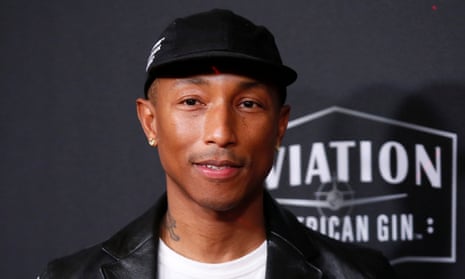It feels like a bit of a sick joke dropped in the midst of coronavirus: it was announced on Monday that Pharrell’s Happy was the most played song on British radio in the 2010s, according to data from music royalties organisation PPL.
Even the luckiest people during the crisis, the natural introverts who haven’t faced health problems and already had a really good ergonomic desk chair to work from home with, aren’t likely to be a Happy kind of happy. The song evokes that rare combination of latent contentment and acute joy, the kind of feeling you have walking home after having sex with someone out of your league, or past some cherry blossom after three pints. It feels obnoxious to be reminded of it now. The ambient hum of anxiety we all now hear at a greater or lesser volume puts the song into a different key – and yet, perhaps it can still chime with our current moment.
On paper, Happy’s cultural domination was never a given when it was released in 2013. Pharrell had achieved wedding-disco ubiquity with Daft Punk’s Get Lucky, but had also just sported with Robin Thicke and assorted glamour models in the video to Blurred Lines, the latest sex-fixated song in a recording career that once featured a track closing with three minutes of orgy sounds. He was also the chief musical foil for Pusha T’s numerous drug-trafficking tales, and thus not the most likely candidate to soundtrack Despicable Me 2, an animated kids’ movie.
The song was originally written for Cee-Lo Green, but it didn’t chime with his planned Christmas album, and ended up back with its writer, Pharrell: an inauspicious start. It was also the 10th song Pharrell had attempted for Despicable Me 2, after nine rejections, and even Happy was rejected on first listen. Yet, as well as its success on UK radio, it topped the charts in 24 countries and was the biggest-selling song in the US and UK in 2014.
The reason, of course, is that it’s charmingly infectious, but being part of a beloved children’s movie franchise helped – it was surely the catalyst for Can’t Stop the Feeling!, the Justin Timberlake song that soundtracked Trolls and is at No 5 in the same British radio airplay chart. As Let It Go also showed during this period, children fixate on a single musical number, thus ensuring those billions of streams.
A more profound key to Happy’s success is that it unites adults and children in an idea they want to get behind. For all the poetry in feeling “like a room without a roof”, Pharrell regresses (or, arguably, advances) to being a clapping child again – he never says why he’s happy, only that he is. It’s so bracing to have that reinforced amid all the breakups and bacchanals of Top 40 radio. His song tells children something they already know but reminds adults of something they forgot: being happy for happy’s sake.
There is something supernatural about his happiness – he is utterly impervious to “bad news, talking this and that”, and tells it not to waste its time on this Teflon Don of good vibes. This is the kind of magical thinking you have to reach for in times of crisis, saying things so that they might come true. Singing along to Happy is helplessly, stupidly effective, and even if it doesn’t work for long, there’s at least the black comedy of singing it during the worst health and economic crisis of most of our lifetimes. No wonder it’s been used as a handwashing song. Acknowledging this week’s No 1 radio play spot, Pharrell said: “This is a crazy time and I know we listen to songs to help us get through things, and if any of my music could have ever helped you in this way, I am very grateful.”
Happy, then, is less a song and more a sort of spell, an incantation, a self-fulfilling prophecy. It’s the kind of thing a persuasive life coach would have people in a suburban hotel’s conference suite chant as one, leaving them feeling as if they really can do anything, even if they materially can’t. As the death toll rises, Happy will take on an absurdist edge, and feel horribly taunting to some. But its occult ability to jumpstart joy means it still deserves its place on the radio waves.

